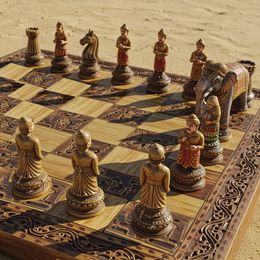We invented chess, which was pretty cool of us. The original game ‘chaturanga’—that is four divisions (infantry, cavalry, elephantry and chariotry)—was a war strategy game. When the game travelled to the Middle East, they mangled the Sanskrit and it ended up being called ‘shatranj’ instead. The pawn (infantry) and the knight (cavalry) are still very much in evidence on the modern chess board but the Persians mispronounced rath (chariot) as rukh, which got translated in Europe to rocca which means ‘fortress’ in Italian. And so we have the rook, which looks like a castle. The elephant shared a similar fate, as the stylised design of the piece resembled a bishop’s mitre, so the Europeans (who clearly had no issues mixing church and state) started calling it the bishop.
The Middle Easterners also came up with ‘shah-mat’ to indicate that the king’s defeat was imminent, which led to westerners mangling the term to ‘checkmate’. Still, it is very much an Indian game, and we are damn good at it—just look at our grandmasters and everything.
It’s interesting that in the game India invented, victory is defined by the killing of the opposing king. Compare that to a game called Chinese checkers, where victory means ensuring that each and every piece crosses over to the other side, with none left behind. Chinese checkers is basically sabka saath, sabka vikas on a star-shaped cardboard (By the way, Chinese checkers was not invented in China. It originated from the German ‘Hamla’, which in turn originated from the English ‘Hoppitty’ and was actually rebranded Chinese checkers by an American marketing team.)
I hear that—fuelled by the success of our lad Gukesh (quarter final loss to Caruana notwithstanding) and the charms of Anna Taylor-Joy in The Queen’s Gambit—chess clubs are mushrooming all over our country and online. Which is great. But what I would really welcome is making Chinese checkers mandatory in our primary schools—even if it is just in moral science class. Because for how long will we derive our national pride from the victories of one, or two, or three extraordinary ‘kings’?
So what if Satya Nadella or Priyanka Chopra or Rishi Sunak have briefly made it big? Who cares how much money the latest Telugu film made overseas, or how ‘tight’ Modi reportedly is with Trump, or many crores our phalanx of crazy rich Indians threw at first world celebrities to come dance at our weddings? The bitter truth is that ordinary Indians have been returned handcuffed and leg-shackled on military planes from the US, simply because they saw absolutely no future for themselves in India.
That the Mahakumbh, billed as the greatest festival of faith on earth, has seen fires, pollution, pawing, sexual harassment, traffic snarls and the death of an undisclosed number of ordinary Indians in stampedes caused mainly by organisational mess-ups. That unemployment is at an all-time high and the stock market at an-all time low. That our prime minister is appeasing a man who has just put the brakes on a law that forbids US companies from bribing foreign officials in order to win business from them—a move that will undoubtedly make the richest Indians even richer. We need to stop applauding the sporadic victories of ‘kings’. And understand that we only win when all of us win.
editor@theweek.in


